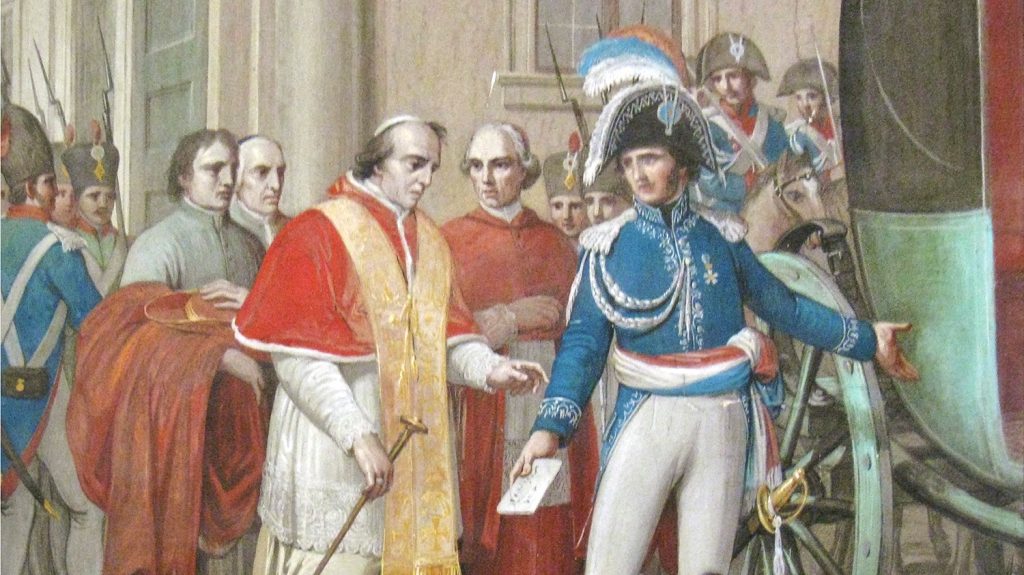Thrillingly, one of Napoleon’s generals, Etienne Radet, kidnapped the Pope tonight in 1809. The kidnap (above) came at the end of a long war of words between the Emperor and the Pope, during which Napoleon annexed the papal territories, and Pius VII hit back with a humiliating excommunication. When Napoleon exclaimed that Pius was mad and should be locked up, General Radet took it a bit too seriously. His men raided the Vatican by night, climbed in through a window, surprised the Swiss Guard, and carried off the Pope. Pius remained under house arrest in France for the next five years.
‘I am Charlemagne, the sword of the Church and their Emperor. I should be treated as such… I have briefly laid out my intentions. If he does not reply, I shall reduce him to the condition of his predecessors before Charlemagne.’ Napoleon, letter about Pope Pius VII to his ambassador in Rome
Grete Adrian, a farmer, was executed as a witch today in 1655, in Rüthen, Germany. She had been accused of making milk by magic, having the Devil sitting in her hallway, and turning into a werewolf. Under torture she confessed that she was in league with the Devil, and was beheaded. In 2011, she was pardoned by the city council of Rüthen, after a petition by local schoolchildren.
Richard Niebuhr, the American theologian and ethicist, died today in 1962, in Greenfield, Massachusetts. He is best known as the author of the landmark book, Christ and Culture (1951), which debates how the Christian faith relates to modern culture. Is Christ against, above, identical with, in paradox with, or transforming culture?
Today in 1439 the Eastern Church accepted the filioque, a single Latin word meaning, ‘and the Son’. The word had been inserted into the Nicene Creed by the Western Church, and introduced a change into the doctrine of the Trinity, saying that the Holy Spirit does not proceed solely from the Father, but ex Patre Filioque – ‘from the Father and the Son’. The addition caused huge upset and anger in the Eastern Church, and was one cause of the Orthodox-Catholic schism. Today in 1439, though, at the Council of Florence, the Easterners agreed to use the filioque, as they were facing defeat by the Ottoman Turks, and needed Western military support. However, the wider Orthodox Church refused to accept the decision made at the council, and 14 years later, Constantinople was conquered by the Turkish Empire.
It is the feast of St Athanasius the Athonite, the 10th century founder of the first monastery on Mt Athos, the renowned monastic peninsular in northern Greece. His monastery still exists and is simply called ‘The Monastery’ (Lavra), setting it apart from the 19 other monasteries which were founded later. Athanasius was disliked by the hermits already living on Athos when he arrived, but he had the financial support of the Byzantine Emperor. He died when the dome of his church collapsed on top of him.
Image: Benoit Lhoest
